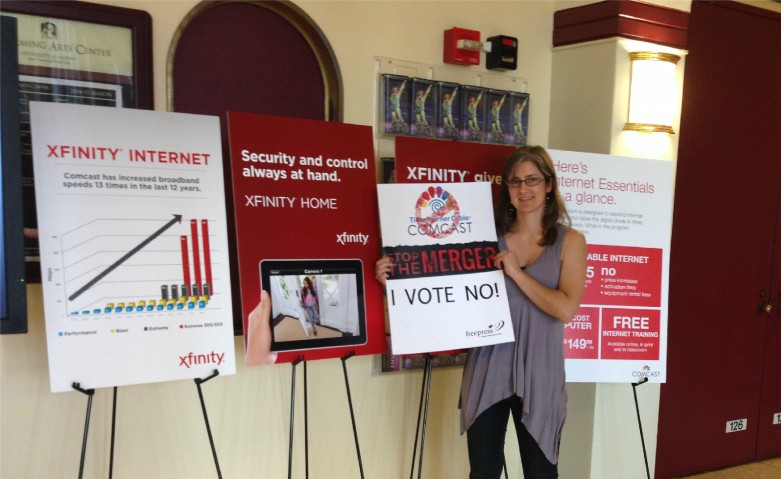
Free Press Counters Comcastic Lies at Hearing in Albany
On Wednesday night I ventured out of Western Massachusetts’ Comcast country into Albany’s Time Warner Cable territory to testify at a hearing hosted by the New York State Public Service Commission.
At issue were the 3 million New York customers Comcast would serve if its merger with Time Warner Cable goes through.
At the hearing, a handful of folks expressed concerns about the deal, fearing it would degrade services, increase costs and give Comcast a monopoly in New York.
A new Consumer Reports National Research Center poll echoes those concerns. Fifty-six percent of those polled oppose the merger. Seventy-four percent believe the merger will result in higher Internet and cable prices. Seventy-four percent also believe the merger will diminish the number of cable and Internet providers because smaller companies won’t be able to compete with Comcast. And 81 percent of Americans are concerned that Comcast’s increased market share will enable it to favor its own programming over its competitors’.
Comcast Buys Its Friends
Comcast brought its pals — its so-called “community partners” — to Albany to tout the company’s supposed merits. The partners mentioned that Comcast’s support (read: lots and lots of money) has helped them beautify their buildings and provide garden space for their clients.
While flowers are nice they have nothing to do with Comcast’s ability to provide accessible, affordable and competitively priced cable, phone and Internet services. Plants certainly won’t help the New York State Public Service Commission determine whether the merger would bring any positive benefits to New Yorkers.
Comcast spends a lot of money to get its way, shelling out $18 million on lobbying in 2013 alone — making it second only to military contractor Northrop Grumman in lobbying expenditures by a single company. And this figure doesn’t include the dollars Comcast throws around to ensure its “friends” will say nice things about it when it wants to push a deal through.
So make no mistake — Comcast’s supposed community outreach is intended to line its pockets rather than help people access the services they need to participate in 21st-century life.
Comcast Uses Kids for Good PR
Speaking of helping people get connected — let’s be sure to look into Comcast’s flawed Internet Essentials program, which the company spent so much time heralding in Albany. This program is intended to provide low-cost Internet access to those who need it most — but simply qualifying for the program can be a barrier and it’s not easy to sign up. But don’t take my word for it — check out Dawn Hawkin’s story about the challenges of getting online in the Media Mobilizing Project video The Spark: Stories That Change Our Times.
Right now, only a small fraction of those who are eligible for Internet Essentials are served. And the program helps only people with school-aged children who are eligible for school lunches. In addition, subscribers cannot be current Comcast customers and they cannot have any past outstanding bills. The program doesn’t help seniors or singles who need to use the Internet to apply for jobs, file for Social Security benefits or simply stay in touch with their loved ones.
When the Commission asked how many people in New York State would be eligible for this program, Comcast didn’t have an answer. Similarly, when questioned about universal service that goes beyond Internet Essentials, Comcast brushed off the question and took the time to talk about how amazing it is for offering Internet Essentials in the first place.
Comcast also stayed silent when a few folks mentioned that New York Time Warner Cable customers will almost certainly see their bills rise if the merger goes through. Time Warner Cable offers a plan that provides Internet access for $14.99 with no preconditions, contract or qualifications. Comcast has no such plan.
The Slow-Down
Comcast claims it has the fastest Internet speeds around. But last time I checked, the United States ranks near the bottom of the barrel in terms of overall Internet speeds when compared with other developed countries. So let’s be clear: Comcast is not interested in bringing fast Internet to New Yorkers or anyone else in their service areas around the country.
What Can Comcast Do to Serve the Public?
If Comcast cares as the company says it does, it can innovate and help people out by actually serving its customers. It can invest in its network, increase broadband speeds and work to close the digital divide. It could use the billions it’s preparing to spend on the deal to bring ultra-fast fiber broadband to millions of existing and future customers.
Instead, Comcast is set on buying up its competition so it can raise prices, squash competition and reshape the future of the Internet — for the worse.
If this merger goes through, Comcast will be able to use its market power to close down the open Internet, increase costs and harm broadband access. The company will be so huge that it’ll set the agenda for the entire telecom industry.
Next Up
On behalf of Free Press’ more than 50,000 members in New York, I urged the New York State Public Service Commission to vote against the transfer of Time Warner Cable services and customers to Comcast and to send a strong signal to the FCC and the Justice Department as they prepare their formal reviews of this deal.
Thursday night, others will send the same message at the third and final hearing, which will be held in New York City. Stay tuned for information, photos and possible video from the finale.
P.S. Sometimes the funniest things are the truest things, as photographer Stacie Huckeba’s blog post illustrates. She’s concerned about Comcast’s monopoly power too.